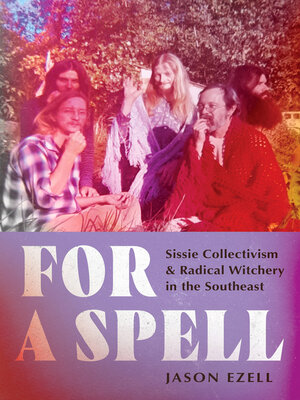For a Spell
ebook ∣ Sissie Collectivism and Radical Witchery in the Southeast · Gender and American Culture
By Jason Ezell

Sign up to save your library
With an OverDrive account, you can save your favorite libraries for at-a-glance information about availability. Find out more about OverDrive accounts.
Find this title in Libby, the library reading app by OverDrive.



Search for a digital library with this title
Title found at these libraries:
| Library Name | Distance |
|---|---|
| Loading... |
In the Southeastern United States of the late 1970s, a regional network of radical communal gay households formed in the face of rising New Right terror. Consisting of primarily white, self-described sissies, the Southeast Network, as it came to be known, spanned from the Ozarks, to New Orleans, to Appalachian Tennessee. Though this network was short-lived, its legacy lives on today through Short Mountain Sanctuary, a thriving member of the international Radical Faerie movement. Jason Ezell’s intimate account of the formation and dissolution of these sissie houses reveals a little-known history of Southern gay liberation, nonbinary gender expression, and radical feminism and femininity.
Drawing on journals, letters, oral histories, collective manifestos, and newsletters, Ezell illustrates how these gay households nurtured their community through lesbian feminist practices such as collectivism, consciousness-raising, witchcraft rituals, and rural gatherings. As people and practices traveled from one house to another, these linked houses attempted to conjure underground sanctuaries for queer Southerners. Preserving their moving stories, Ezell details the visions, experiments, and shortfalls of these radical households in their attempts to build solidarity, resist mounting right-wing violence, and sustain their revolutionary dreams for queer movements yet to come.
Drawing on journals, letters, oral histories, collective manifestos, and newsletters, Ezell illustrates how these gay households nurtured their community through lesbian feminist practices such as collectivism, consciousness-raising, witchcraft rituals, and rural gatherings. As people and practices traveled from one house to another, these linked houses attempted to conjure underground sanctuaries for queer Southerners. Preserving their moving stories, Ezell details the visions, experiments, and shortfalls of these radical households in their attempts to build solidarity, resist mounting right-wing violence, and sustain their revolutionary dreams for queer movements yet to come.







